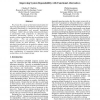74 search results - page 3 / 15 » Implementation of Combinational and Sequential Functions in ... |
ICFP
2009
ACM
14 years 7 months ago
2009
ACM
Functional logic programming and probabilistic programming have demonstrated the broad benefits of combining laziness (non-strict evaluation with sharing of the results) with non-...
BMCBI
2004
13 years 6 months ago
2004
Background: Multiple sequence alignment algorithms are very important tools in molecular biology today. Accurate alignment of proteins is central to several areas such as homology...
AOSD
2007
ACM
13 years 10 months ago
2007
ACM
Embedded systems are an important field of research and will gain momentum in the near future. Many of these systems require data management functionality. Due to the resource con...
DSN
2004
IEEE
13 years 10 months ago
2004
IEEE
We present the concept of alternative functionality for improving dependability in distributed embedded systems. Alternative functionality is a mechanism that complements traditio...
CEFP
2005
Springer
14 years 8 days ago
2005
Springer
This chapter describes Hume: a functionally-based language for programming with bounded resource usage, including time and space properties. The purpose of the Hume language design...

